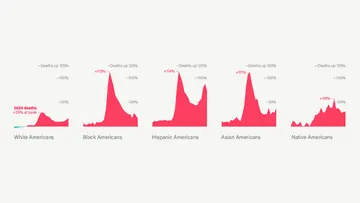For the first time since coronavirus outbreaks began in federal prisons in March, the agency that oversees them is reporting the number of sick prisoners in 11 facilities run by private contractors.
But the Bureau of Prisons is not saying how many staffers are ill in those facilities, or how many people are being tested there.
The bureau’s new figures counted 110 prisoners with lab-confirmed COVID-19 in its privately run prisons, less than 1 percent of the roughly 17,000 people incarcerated there. No deaths were reported. Most of those locked in the 11 facilities are non-citizens who will be deported after the completion of their sentences, the bureau said. These infections add to the more than 20,000 prisoners nationwide who have tested positive for the coronavirus.
The bureau released the new numbers days after The Marshall Project asked the agency why the official tally did not include its privately run prisons, and more than a month since officials began reporting federal prison numbers. A one-page memo with the new numbers, posted on the agency’s website Thursday, didn’t explain the delay in reporting them. It also did not provide answers sought by doctors and public health experts fighting the pandemic, including how many prisoners were tested and how many guards and other staff members have been tested or confirmed positive.
The bureau won’t provide those numbers, according to BOP spokesman Justin Long. He did not explain why. The memo said all sick prisoners are being properly isolated, but it did not say if others possibly exposed are being quarantined to slow down spread of the virus.
The memo and the numbers are unhelpful and discouraging, according to Lauren Brinkley-Rubinstein, a professor at the Center for Health Equity Research in the University of North Carolina School of Medicine, who is also tracking cases of COVID-19 in state and federal prisons.
Two of the federal prisons run by private companies qualify as clusters of the disease under the Centers for Disease Control and Prevention guidelines: Great Plains Correctional Institution in Oklahoma, with 27 prisoners with confirmed cases, and Rivers Correctional Institution in North Carolina, with 18. States that have responded to prison clusters with comprehensive testing have found that a majority of inmates are positive with coronavirus.
“You cannot convince me that there are only 110 cases in these prisons,” said Brinkley-Rubinstein. “It’s impossible to understand what is going on at the facilities.”
In fact, the North Carolina cluster is twice the size of that reported by federal officials, according to state health agency numbers that also include staff cases. Those state figures show an additional 21 cases among staff at the Rivers prison, run by Geo Group.
CoreCivic, another private contractor involved, said that 19 of its employees have tested positive at its prison in McRae, Georgia.
Those reported staff numbers are the exceptions to the rule. In Texas and Pennsylvania, home to six of the 11 private federal prisons, health officials said the prisons are not reporting case numbers to state or local health agencies.
Few prison systems have undertaken widespread testing of the people locked inside, but some that have found widespread infection at rates of 65 percent or more. Many prisons are only testing people who are displaying symptoms, not reporting testing results for guards and other staff or not testing at all, The Marshall Project has found.
The call to test correctional officers and other staff was highlighted Thursday by two organizations who have sometimes been at odds in previous years: The American Civil Liberties Union and the union representing federal correctional workers, the Council of Prison Locals.
Jails and prisons make up six of the 10 largest coronavirus hotspots nationwide, the organizations said in a joint statement asking that all state and federal prisons conduct mass testing of all employees and incarcerated people.
Brinkley-Rubinstein said she was troubled by some of the language in the BOP’s private prisons memo, which said: “Unlike federal inmates housed in BOP facilities, the contractor is responsible for the medical care and the costs associated with providing those services.”
She disputed that. “The Bureau of Prisons is responsible,” she said. “These people are still in their care.”
